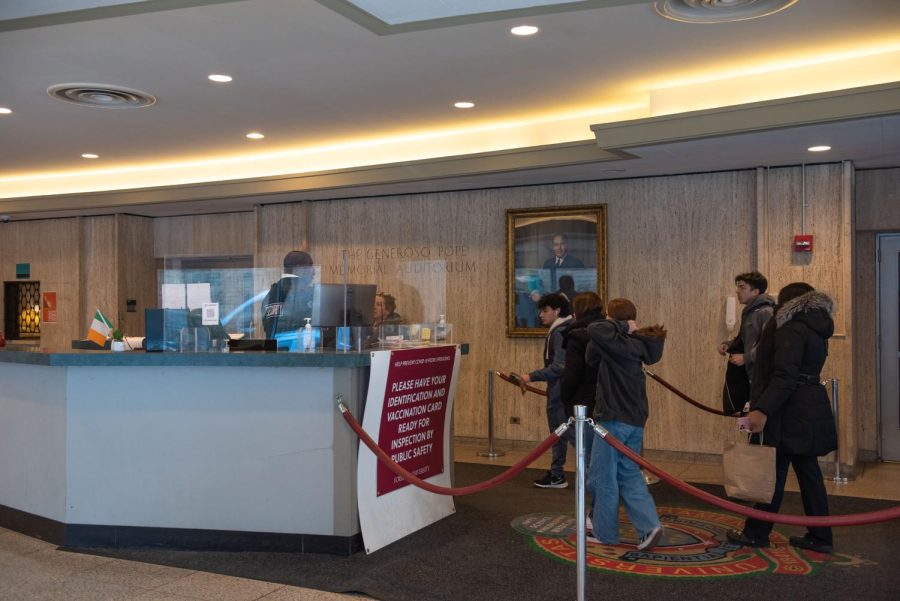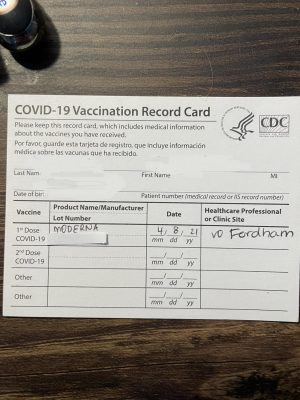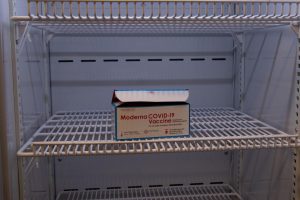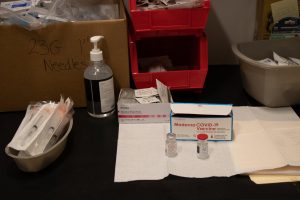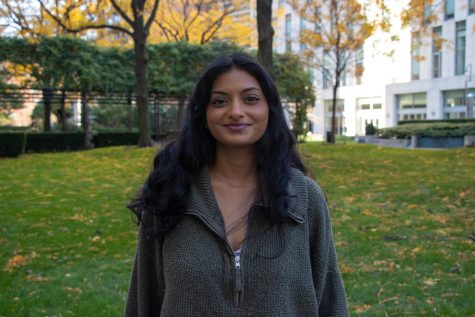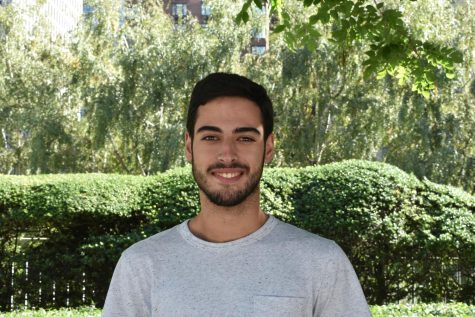COVID-19 Vaccine No Longer Required, Effective May 15
The university’s decision to lift the vaccine mandate was informed by public health trends and the pandemic’s trajectory
The university will lift the vaccine mandate and discontinue the use of VitalCheck, though COVID-19 testing and vaccination services for students will continue.
March 22, 2023
Two months before the spring semester’s conclusion on March 20, University President Tania Tetlow, J.D., announced changes to the university’s COVID-19 protocols in an email sent to the Fordham community. The policy decisions included the lifting of the COVID-19 vaccine mandate required for both university enrollment and on-campus visitation as well as discontinuing the use of VitalCheck, a telehealth screening program used by the university to track vaccination statuses and COVID-19 cases on campus.
This decision will go into effect on May 15, the last day of final exams for the spring 2023 semester.
The email adds that University Health Services (UHS) will continue to offer resources for protection against the virus. COVID-19 vaccinations and testing to students will remain available. Tetlow directed university employees to their health care insurance providers to receive these services.
Tetlow also announced that the university will discontinue the use of VitalCheck, a telehealth screening program used by the university to track vaccination statuses and COVID-19 cases.
Starting Aug. 8, 2022, the VitalCheck requirement was lifted, but Fordham has continued to be used to manage vaccine requirements, track symptoms and offer student telehealth appointments.
As part of the university’s reopening process, students were required to fill out a daily health questionnaire reporting any COVID-19 symptoms before entering campus. Starting Aug. 8, 2022, the VitalCheck requirement was lifted, but Fordham has continued to be used to manage vaccine requirements, track symptoms and offer student telehealth appointments.
According to Tetlow’s announcement, the decision to lift the vaccine mandate and discontinue the use of VitalCheck is a result of the federal government’s decision to end the COVID-19 national emergency and public health emergency (PHE), which the Trump administration declared on March 1, 2020. The emergency declarations were set to expire on March 1 and April 11 respectively, but the Biden administration extended both declarations to end on May 11.
Tetlow explained that the same data used to dictate all of the university’s former COVID-19 policies have advised these decisions along with “broad consultation with our community.”
“Though we had broad consensus, the University can’t set public health policy by poll: we’re fully aware that any decision we make will cause some controversy.”Bob Howe, assistant vice president for communications
Bob Howe, assistant vice president for communications, explained that the university has been in contact with members of the university community since November. These communications have included the Faculty Senate, leaders of student government, the Cabinet, and hundreds of other individual faculty, students, staff and parents. The majority of guidance the administration received was in favor of lifting the vaccine mandate, according to Howe.
“Though we had broad consensus, the University can’t set public health policy by poll: we’re fully aware that any decision we make will cause some controversy,” he said.
The university’s decision to lift the mandate was met with some confusion among students considering the university’s controversial announcement six months prior that they would be requiring students, faculty, and guests to receive the bivalent booster to enter campus starting Nov. 1, 2022.
Tara Salem, Fordham College Lincoln Center (FCLC) ’25, said she believes that the announcement to lift the vaccine mandate was unexpected and abrupt. She added that the decisions surrounding the protocol affect more than the vaccine requirement and noted that the decision to take away VitalCheck impacts knowing which members of the Fordham community are experiencing symptoms.
“I was not expecting these changes to happen so fast considering how Fordham put so much money and pressure into their COVID-19 protocols.” Tara Salem, FCLC ’25
“I was not expecting these changes to happen so fast considering how Fordham put so much money and pressure into their COVID-19 protocols,” Salem said. “With Fordham mandating the bivalent booster back in November, which so many students opposed, to now not requiring a single COVID-19 vaccine makes me wonder what triggered this decision.”
Abigail Padilla, FCLC ’26, echoed similar sentiments regarding the university’s varying vaccine protocols during the 2022-23 academic year and shared a comparable reaction to the announcement.
“They recently implemented a requirement for the second booster, so them going from that to suddenly lifting the entire mandate is a little surprising,” Padilla said.
Unlike both students, Bruce Berg, professor of political science at Fordham Rose Hill, said that he was not shocked by this decision because other universities in the surrounding area have recently removed their vaccine mandates. He cited Columbia University, which lifted its vaccine mandate policy on Feb. 23, as an example.
“I would wait for other schools in the tri-state area to lift their requirement, and then I think it would be safer to judge lifting our own policies.” Abigail Padilla, FCLC ’26
“There’s a lot of information out there that no one has yet,” he said. “And I think that other universities are probably waiting to see.”
Padilla expressed that although Columbia lifted its mandate, Fordham should have waited for more universities prior to making its decision.
“We are in a city with close proximity to one another, so I don’t know if this is too soon,” she said. “I would wait for other schools in the tri-state area to lift their requirement, and then I think it would be safer to judge lifting our own policies.”
Berg noted that despite the university’s removal of the vaccine requirement, he suspects that a majority of students will continue to receive the COVID-19 vaccine as long as it is offered. He added that there is anticipation regarding announcements from the Centers for Disease Control and Prevention (CDC), on which the university has relied for guidance on its policies since the pandemic’s commencement, as to whether or not the COVID-19 vaccine should be received by individuals annually.
According to an article published by The Observer on Nov. 1, 2022, Howe said that the university relies on the CDC for its COVID-19 protocols.
The CDC currently recommends all individuals over the age of 6 receive any of the FDA approved vaccinations and continue to stay up-to-date with their vaccination status by receiving the most recent booster dose recommendation, which varies depending on age group and type of vaccination series received.
In her announcement, Tetlow said that recent developments within the pandemic suggest that vaccination is now a matter of personal responsibility.
“What was once a critical way to protect the most vulnerable in our community has become more of an individual choice about safety, one we urge you to take seriously.” University President Tania Tetlow, J.D.
“What was once a critical way to protect the most vulnerable in our community has become more of an individual choice about safety, one we urge you to take seriously,” she said.
The president advised the Fordham community to be mindful of those who continue to be especially vulnerable to the virus by staying home and wearing a mask after testing positive for COVID-19.
All other university protocols will continue after these changes are put into effect on May 15. Tetlow said that the university plans on reviewing each of the university’s COVID-19 protocols and will announce if there are any further changes before the start of the fall semester.

